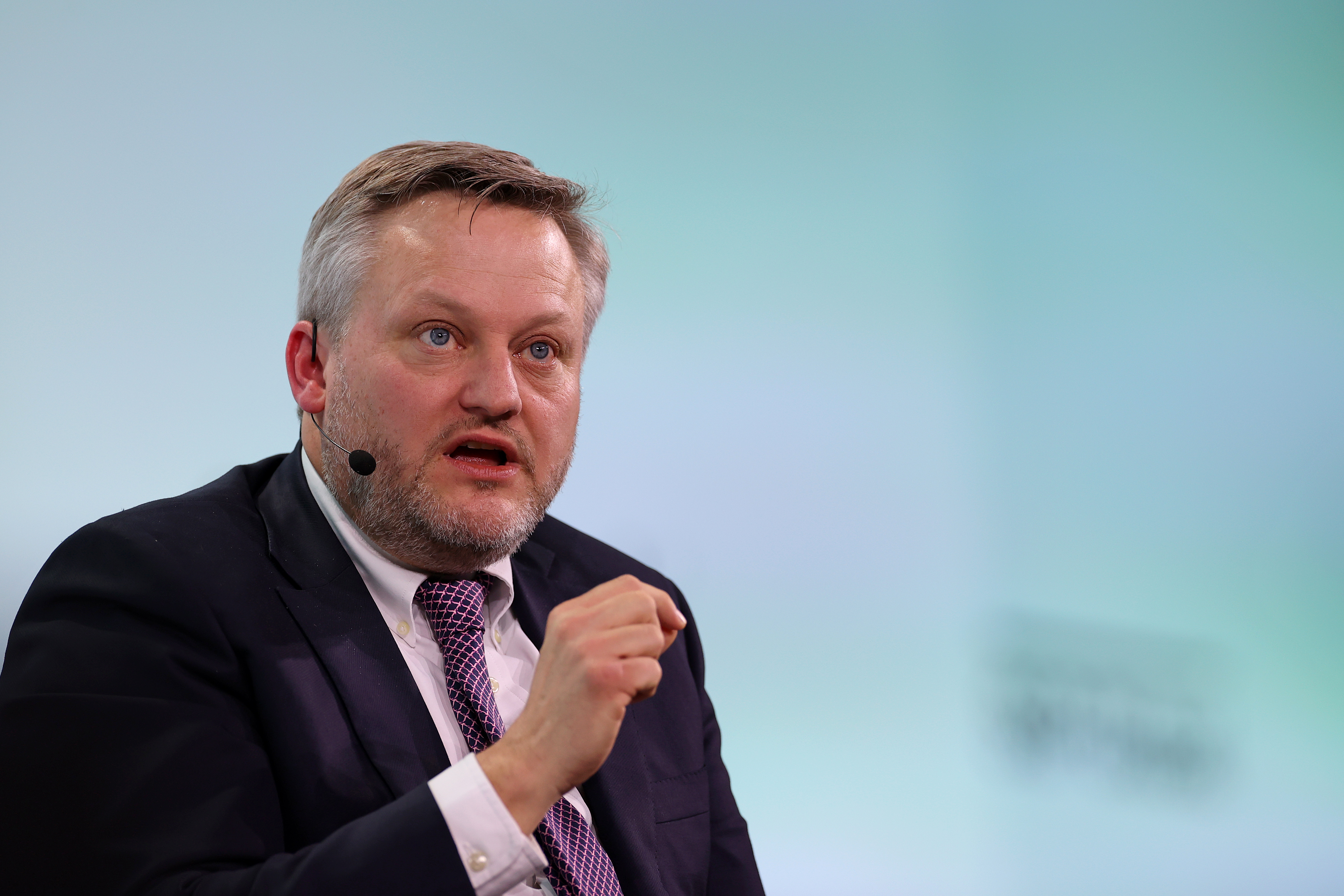The sell-off in London has gained momentum before a finely balanced Bank of England interest rate meeting this week and echoing a broader risk-off mood across global markets.
The FTSE 100 was down 112 points, or 1.16 per cent, at 9,590.70. The fall was more subdued than in Germany and France, which lost 1.8 per cent and 1.77 per cent respectively.
There were just ten gainers in the blue-chip index, with property stocks up on hopes of an interest rate cut which should encourage homebuyers. Defensive utility stocks were also higher.
Miners continued to dominate among the fallers with the copper producer Antofagasta down 4.19 per cent.
The Primark owner ABF dropped 3.86 per cent after rising earlier following the announcement that it was considering spinning off the retailer as it reported a fall in annual profits.
Financial stock were down as a fall in interest rates would cut into net interest margins.
Pound slides on UK commitment to fiscal rules
The pound has fallen after the chancellor stressed her commitment to sticking to her fiscal rules in the budget, even as high interest rates and years of underinvestment constrained public spending.
Sterling fell 0.5 per cent against the dollar to $1.3076, down from around $1.311 before the speech by Rachel Reeves. The pound had its worst monthly performance against the dollar in October since July.
The pound was weaker against the euro. The euro was up 0.4 per cent at 88 pence, a two-and-a-half year high against sterling.
Kit Juckes, head of currency strategy at Societe Generale in London, said: “This is a budget that is intended to deliver lower interest rates, that is the whole plan here. If Reeves get that we will get lower rates and a weaker pound.”
Norway oil fund says no to Musk’s $1 trillion package
Elon Musk
NORA TAM/SOUTH CHINA MORNING POST/GETTY IMAGES
Norway’s sovereign wealth fund said it would vote against ratifying the proposed $1 trillion compensation package for Elon Musk, the Tesla chief executive.
Investors in the electric car maker will decide on November 6 whether to approve the package, which critics have called excessive.
Baron Capital, another big Tesla investor, has said it would back the package. However, Tesla’s biggest institutional investors, including BlackRock, Vanguard and State Street, have yet to disclose their voting plans.
Musk has defended the package, saying it is less about “money for me” and more about having enough voting influence in Tesla to pursue ambitious projects such as robotics and autonomous mobility, without fear of being ousted.
Robyn Denholm, Tesla’s chair, has said that Musk could leave if the package is not passed.
UK gilt yields fall as Reeves reassures bond investors
UK borrowing costs have fallen after bond investors were reassured that Rachel Reeves is preparing significant tax rises to fill the hole in the public finances.
Bond prices rose and yields fell across the curve. The yield on ten-year UK gilts, regarded as a proxy for government borrowing costs, fell 6 basis points to 4.42 per cent. The 30-year UK government bond yield slid 6 basis points to 5.19 per cent.
Major bond fund managers such as Pimco and BlackRock have publicly urged the government to build a larger fiscal buffer in the budget. They cautioned that markets may penalise the UK if fiscal discipline weakens.
Reeves said that the government’s commitment to fiscal rules was “iron-clad”, adding: “The less we spend on debt, the more we can spend on the priorities of working people.”
Reeves makes case for big tax rises 
Rachel Reeves delivers her pre-budget speech
ANDY RAIN/EPA
The chancellor Rachel Reeves has started to make the case for reversing policy and bringing in substantial tax rises in the budget in a speech at Downing Street.
The chancellor laid out her three priorities for this month’s budget: cutting NHS waiting lists, reducing national debt and reducing the cost of living.
Sir Keir Starmer and Reeves have pointedly refused in recent weeks to commit themselves to their manifesto pledge not to raise income tax, VAT or national insurance contributions.
They face a shortfall in the public finances of about £20 billion.
More here: Rachel Reeves speech: chancellor prepares for autumn budget – follow live
FTSE 100 joins stock market sell-off
London’s leading share index has joined a stock market sell-off after top US executives cautioned about the possibility of a significant correction.
The FTSE 100 fell 77 points, or 0.8 per cent, to 9,614.21, following falls in markets across Asia, with Japan’s Nikkei losing 1.7 per cent, South Korea’s Kospi down 2.4 per cent and Hong Kong’s Hang Seng sliding 0.7 per cent.
The chief executives of Goldman Sachs and Morgan Stanley were among Wall Street executives at a summit in Hong Kong who voiced the possibility of a significant sell-off in the coming period because of the high valuations of companies.
Miners were among the biggest fallers, with Antofagasta, Fresnillo, Anglo American and Endeavour Mining sliding. Financial stocks were also lower.
Associated British Foods was the biggest riser after the conglomerate owned by the billionaire Weston family said it was considering a possible break-up.
ABF review could see Primark spun off
Twinings is an Associated British Foods brand
ALAMY
Associated British Foods could spin off the retailer Primark as it mulls a break-up of the business.
The board of ABF has been conducting a review of the group structure with a view to maximising long-term value. The company said: “Although no decision has been taken, the outcome of this review may lead to the board deciding to undertake a separation of the Primark and food businesses.”
The food businesses include a sugar arm and products such as Twinings tea.
The surprise review came alongside the results for the year to September showing a 26 per cent drop in profit before tax to £1.4 billion on group revenue, down 3 per cent to £19.5 billion. Growth in its retail business was offset by a decline in the sugar business that reflected low European prices.
The review is being conducted in consultation with ABF’s largest shareholder, Wittington Investments, which is majority-owned by the Weston family foundation.
BP profits above expectations
Murray Auchincloss
AARON M SPRECHER/BLOOMBERG VIA GETTY IMAGES
Higher oil and gas production and a recovery in refining margins have lifted profits for BP above expectations, in a boost to efforts by its under-pressure boss to revive investor confidence in the oil major.
The FTSE 100 oil group reported underlying profit of $2.2 billion for the third quarter, down from $2.3 billion a year earlier, but above the $2.02 billion that City analysts had forecast for the quarter.
The energy group had already warned of a weaker performance from its secretive oil-trading division, but said that it had produced more gas than expected. It will press ahead with another $750 million in share buybacks before the fourth quarter and has declared a quarterly dividend of 8.320 cents a share.
Murray Auchincloss, BP’s chief executive, said: “We are looking to accelerate delivery of our plans, including undertaking a thorough review of our portfolio to drive simplification and targeting further improvements in cost performance and efficiency. There is much more to do but we are moving at pace, and demonstrating that BP can and will do better for our investors.”
Palantir shares fall after strong results
Palantir Technologies forecast revenue in the final three months of year above analysts’ estimates as it reported strong third-quarter results.
Net profits rose 40 per cent year on year to $476 million at the data analytics and artificial intelligence (AI) platform. Revenue increased 63 per cent to $1.18 billion, with revenue in the United States up 77 per cent to $883 million.
Performance was boosted by the rapid adoption of artificial intelligence from businesses and governments. Palantir expects fourth-quarter sales of between $1.327 billion and $1.331 billion, compared with analysts’ average estimate of $1.19 billion.
The forecast implies a slight deceleration in revenue growth to roughly 61 per cent, which for some investors was a “cause of concern given the stock’s lofty valuation” and the shares were down 4 per cent in after-hours trading.
Before the results after trading on Wall Street had ended, the shares had risen 3.3 per cent to a new record high of $207.18. The shares have risen fivefold over the past year outpacing the gains in the world’s most valuable firm — Nvidia — and the benchmark S&P 500 index, amid mounting concerns of an “AI bubble”.
Orsted sells half of UK wind farm to Apollo
The embattled Danish company Orsted is to sell half of what will be the world’s largest offshore wind farm off the Yorkshire coast to Apollo, the US investment giant.
The wind farm developer is selling 50 per cent of its stake in Hornsea 3 for about £4.6 billion. Work on the 2.9 gigawatt wind farm began in 2023 and is expected to cost about £8.5 billion. It will be capable of powering more than three million UK homes on completion.
Orsted has been grappling with supply chain disruption, political opposition to its wind farms in the United States and rising costs. This year it discontinued plans for the Hornsea 4 offshore wind farm.
Starbucks sells control of China operations
Starbucks has fallen behind local rivals in China
ADEK BERRY/AFP VIA GETTY IMAGES
Starbucks is selling control of its operations in China to the investment firm Boyu Capital in a deal that values the business at $4 billion.
The Seattle-based coffee chain has been credited with creating the market for coffee in China after entering in 1999, but its market share fell to 14 per cent last year from 34 per cent in 2019, according to Euromonitor International data.
Starbucks said the funds from Boyu would help it jump-start growth in the world’s second-largest economy, where local rivals such as Luckin and Cotti now offer lattes for less than a third of Starbucks’s prices.
Boyu, whose founders include the grandson of the former Chinese president Jiang Zemin, will hold up to 60 per cent of a new joint venture. Starbucks will hold the rest and continue to license the brand and intellectual property to the venture.

